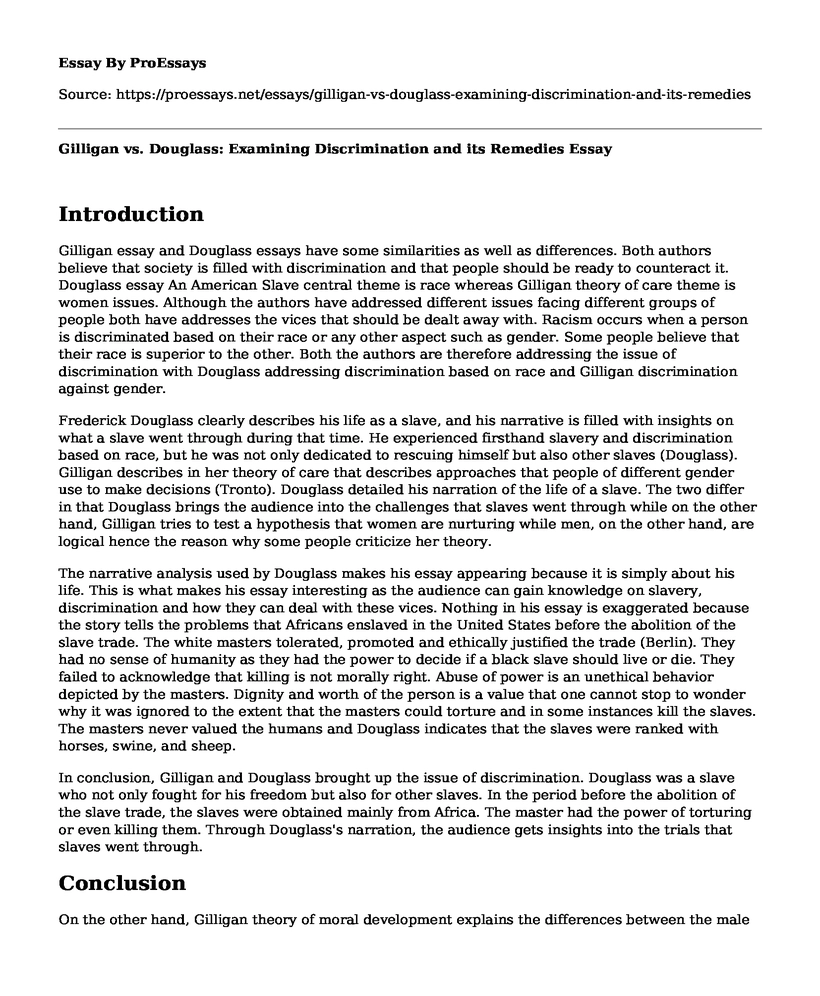Introduction
Gilligan essay and Douglass essays have some similarities as well as differences. Both authors believe that society is filled with discrimination and that people should be ready to counteract it. Douglass essay An American Slave central theme is race whereas Gilligan theory of care theme is women issues. Although the authors have addressed different issues facing different groups of people both have addresses the vices that should be dealt away with. Racism occurs when a person is discriminated based on their race or any other aspect such as gender. Some people believe that their race is superior to the other. Both the authors are therefore addressing the issue of discrimination with Douglass addressing discrimination based on race and Gilligan discrimination against gender.
Frederick Douglass clearly describes his life as a slave, and his narrative is filled with insights on what a slave went through during that time. He experienced firsthand slavery and discrimination based on race, but he was not only dedicated to rescuing himself but also other slaves (Douglass). Gilligan describes in her theory of care that describes approaches that people of different gender use to make decisions (Tronto). Douglass detailed his narration of the life of a slave. The two differ in that Douglass brings the audience into the challenges that slaves went through while on the other hand, Gilligan tries to test a hypothesis that women are nurturing while men, on the other hand, are logical hence the reason why some people criticize her theory.
The narrative analysis used by Douglass makes his essay appearing because it is simply about his life. This is what makes his essay interesting as the audience can gain knowledge on slavery, discrimination and how they can deal with these vices. Nothing in his essay is exaggerated because the story tells the problems that Africans enslaved in the United States before the abolition of the slave trade. The white masters tolerated, promoted and ethically justified the trade (Berlin). They had no sense of humanity as they had the power to decide if a black slave should live or die. They failed to acknowledge that killing is not morally right. Abuse of power is an unethical behavior depicted by the masters. Dignity and worth of the person is a value that one cannot stop to wonder why it was ignored to the extent that the masters could torture and in some instances kill the slaves. The masters never valued the humans and Douglass indicates that the slaves were ranked with horses, swine, and sheep.
In conclusion, Gilligan and Douglass brought up the issue of discrimination. Douglass was a slave who not only fought for his freedom but also for other slaves. In the period before the abolition of the slave trade, the slaves were obtained mainly from Africa. The master had the power of torturing or even killing them. Through Douglass's narration, the audience gets insights into the trials that slaves went through.
Conclusion
On the other hand, Gilligan theory of moral development explains the differences between the male and female approach. In the theory of care, Gilligan argues that women develop morality based on the feelings of care and responsibility that they have for others. Both authors articulate the need for differentiating between right and wrong and doing what is right to others.
Works Cited
Berlin, Ira. The long emancipation: The demise of slavery in the United States. Harvard University Press, 2015.
Douglass, Frederick. Narrative of the Life of Frederick Douglas. JA, 2018.
Tronto, Joan C. "Theory of Care." An Ethic of Care: Feminist and Interdisciplinary Perspectives (2016): 240.
Cite this page
Gilligan vs. Douglass: Examining Discrimination and its Remedies. (2023, Jan 11). Retrieved from https://proessays.net/essays/gilligan-vs-douglass-examining-discrimination-and-its-remedies
If you are the original author of this essay and no longer wish to have it published on the ProEssays website, please click below to request its removal:
- Terrorist Attack on the Eagles of Death Metal Concert
- Essay Sample on Girl Culture
- Distinction Between the Feminine and the Masculine Paper Example
- Beautiful Boy by David Sheff Essay Example
- Sexual Harassment in Public Places: Experience of Canadian Women
- African Americans: Struggling Against Discrimination and Inequality - Research Paper
- Optimistic Bias: The Spirit of Positivity - Essay Sample







